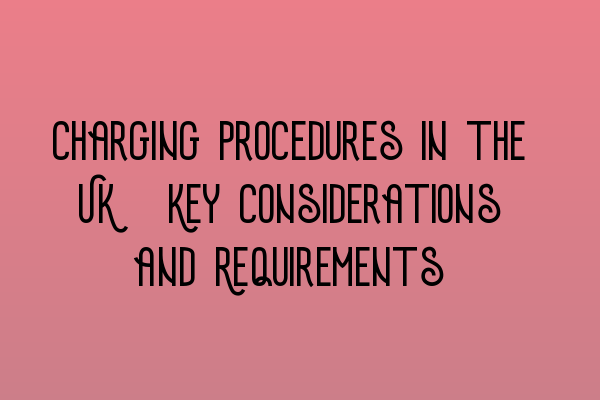Charging Procedures in the UK: Key Considerations and Requirements
When it comes to criminal law in the United Kingdom, understanding the charging procedures is essential for both legal professionals and defendants involved in criminal cases. The charging process plays a crucial role in ensuring fairness, protecting individual rights, and maintaining the integrity of the criminal justice system. In this article, we will delve into the key considerations and requirements surrounding charging procedures in the UK.
Overview of Charging Procedures
The charging procedure begins when law enforcement authorities, such as the police or specialized agencies, believe that an individual has committed a criminal offense. Once they have gathered enough evidence to support their suspicion, they may choose to proceed with charging the individual. The decision to charge someone with a criminal offense is not taken lightly and should be based on solid evidence and legal considerations.
In the UK, the charging process involves several steps that ensure transparency, accountability, and adherence to legal principles. These steps are designed to protect the rights of both the defendant and the public, and to ensure the fair administration of justice. Let’s take a closer look at some of the key considerations and requirements.
Evidence Gathering and Assessment
Before charging an individual with a criminal offense, the authorities need to gather sufficient evidence to support their belief. This evidence can come from various sources, including witnesses, forensic analysis, surveillance, and expert opinions. It is crucial that the evidence gathered is reliable, admissible in court, and meets the legal standards required to establish guilt beyond reasonable doubt.
Once the evidence has been gathered, it undergoes a rigorous assessment process. Prosecutors, who are responsible for bringing the charges against the defendant, review the evidence and evaluate its strength and admissibility. They consider factors such as the reliability of witnesses, the credibility of the evidence, and any potential defenses that may arise. This assessment process helps in ensuring that only cases with sufficient evidence move forward to the charging stage.
Evidential and Public Interest Tests
When making the decision to charge, prosecutors must apply both the evidential and public interest tests. The evidential test requires prosecutors to determine if there is enough evidence to provide a realistic prospect of conviction. In other words, they must be reasonably confident that the evidence will be sufficient to secure a conviction if the case proceeds to trial.
Additionally, prosecutors must consider whether it is in the public interest to proceed with the case. Factors such as the seriousness of the offense, the harm caused to the victim, the defendant’s criminal record, and any potential impact on the community are taken into account. The public interest test ensures that matters involving minor offenses or where prosecution may not be proportionate are dealt with appropriately.
Charge Authorization
Once the evidential and public interest tests have been satisfied, the prosecutor seeks authorization from an appropriate authority to proceed with the charges. This authority varies depending on the seriousness of the offense. For less serious offenses, the prosecutor may grant the authorization, while for more serious crimes, the authorization may be sought from a higher-ranking authority or the court.
The charge authorization process provides an additional layer of scrutiny and serves as a safeguard against frivolous or unjustified prosecutions. It ensures that there is independent oversight and accountability for the charging decision.
Conclusion
The charging procedures in the United Kingdom play a vital role in the fair administration of criminal justice. From evidence gathering and assessment to the application of evidential and public interest tests, every step is carefully designed to protect individual rights and maintain the integrity of the system.
If you require legal representation or advice regarding criminal charges or any other legal matter, our team at SQE Criminal Law & Practice Law UK is here to help. Contact us to schedule a consultation with one of our experienced criminal defense solicitors.
Related Articles:
- Legal Representation for Delaware LLCs in the UK: Expert Advice
- Ensuring Ethical Business Practices: Delaware’s Code of Conduct
- Legal Challenges for UK Businesses in the U.S.: Strategies for Overcoming Hurdles
- UK Criminal Law: An In-Depth Analysis of the British Legal System
- Legal Challenges for UK Businesses in the U.S.: Strategies for Overcoming Hurdles
